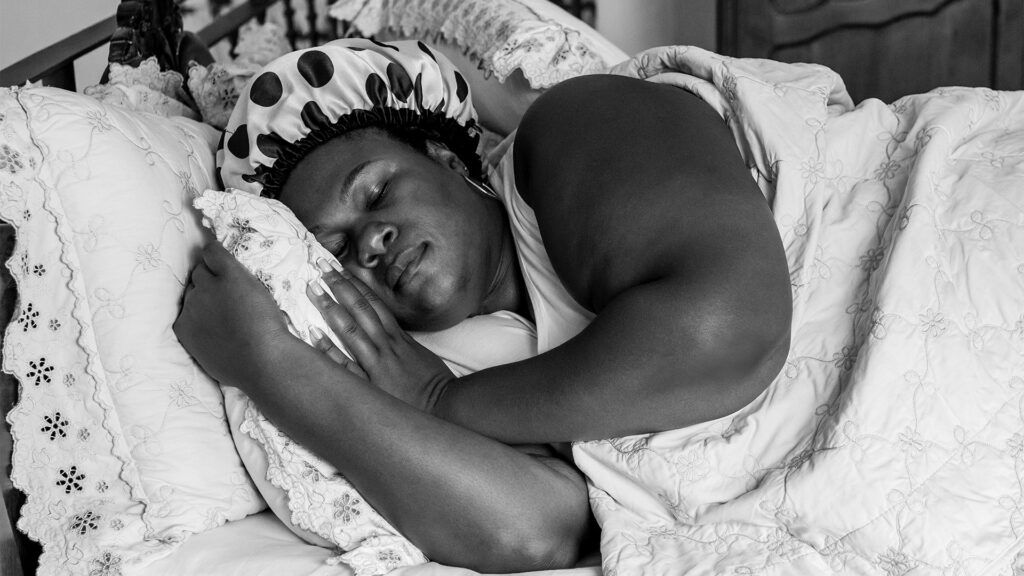Research suggests that getting better quality sleep may help individuals lose weight. Certain sleeping positions may improve a person’s sleep quality, although the best sleeping position can vary depending on several factors.
Different sleeping positions may affect a person’s sleep quality. Getting better quality sleep may help people maintain exercise and diet plans, which could lead to weight loss.
However, more research is necessary to determine if any particular sleeping position can directly cause weight loss.
This article examines how different sleeping positions may affect weight loss, whether a person can burn fat while sleeping, and tips for safe weight loss.

There is no evidence that one particular sleeping position directly causes weight loss.
However, depending on several factors, certain sleeping positions
The following research suggests the quality and amount of sleep a person gets may affect weight loss or gain:
- A 2022 clinical trial cites research that associates sleeping for fewer than
7 hours a night with weight gain and obesity. - The
American Heart Association notes that preliminary research findings suggest people who get better sleep can follow exercise and diet plans more effectively, which could aid in weight loss. - Research has also found that people who experience sleep restriction may lose less fat mass than people who get enough quality sleep.
- A lack of high quality sleep may also increase stress, which
may lead to more cravings for high fat foods and weight gain.
These findings suggest positions that help a person have longer, better quality sleep may help with weight loss.
The best sleep position for a person may depend on any health conditions they have.
Left-side sleeping
Research does not prove that sleeping on the left side can help a person lose weight. However, some research suggests that left-side sleeping may help prevent symptoms of gastroesophageal reflux disease (GERD).
A 2022 study found that people with GERD who slept on their left side experienced a significant reduction of symptoms, such as acid reflux.
People with GERD or those who experience acid reflux may get better quality sleep by lying on their left side. This may help prevent waking during the night or a reduction in sleep quality from uncomfortable symptoms, which could help with weight loss.
A person can position a pillow at the base of their spine to help them remain on their left side and place a pillow between their knees to help support their spine.
Right-side sleeping
No clinical evidence suggests that sleeping on the right side can directly contribute to weight loss.
This sleeping position may worsen GERD symptoms, which could reduce sleep quality in some people. However, sleeping on the right side may also have certain benefits that could improve sleep quality.
A small
Sleeping on the right side
Sleeping on the side may
As with left-side sleeping, a pillow at the base of the back and one between the knees can help support the body.
Supine sleeping
There is also no evidence from research to suggest supine sleeping, which involves lying flat on the back, can directly affect weight loss. However, sleeping on the back may help some people experience better quality sleep, which could contribute to weight loss.
The position
However, some people find the position uncomfortable, and it may worsen symptoms of lower back pain for some people, which could worsen sleep quality.
A small
Supine sleeping
Prone sleeping
No clinical evidence suggests sleeping prone on the stomach directly affects weight loss.
While sleeping on the stomach has some health benefits that may improve sleep quality in some people, experts typically
Prone sleeping can increase pressure on spinal tissues, which can lead to spinal symptoms such as pain and stiffness. This may decrease sleep quality, which could negatively affect weight loss.
Sleeping on the stomach
A person can place a firm pillow under their hips to raise the area and help relieve pressure on the spine in the prone position.
The body burns calories during sleep to continue performing certain functions but does not burn a significant amount of fat.
A person may lose weight during sleep. However, water loss accounts for the majority of this loss, according to older research.
The following steps can help a person lose weight safely:
- eating a healthy diet, which may involve:
- planning meals in advance
- paying attention to food labels and cutting down on foods that are high in fat, sugar, and salt
- swapping sugary beverages for low sugar options or water
- avoiding “fad” diets, which can be difficult to maintain
- eating regular meals and healthy snacks, as skipping meals can lead to snacking on foods that may be more likely to cause weight gain
- getting 150 minutes of exercise per week
- setting realistic, steady, achievable goals, such as aiming to lose 1–2 pounds per week
- seeking support from friends and family
No clinical evidence suggests any particular sleeping position may help a person lose weight. However, better quality sleep may contribute to weight loss or maintenance by helping a person maintain a healthy diet or exercise plan.
It is best for people to sleep in a position that allows them to have the best quality sleep. This may vary for people with certain health conditions.
Research suggests that a lack of quality sleep can make it harder for a person to lose weight. Improving sleep quality may help people lose weight and contribute to overall health.
